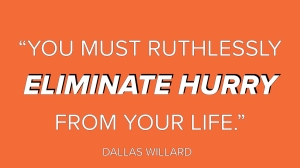
I still remember the time I read a line that changed my life: “You must ruthlessly eliminate hurry from your life.”[1] I was a pastor in urban Milwaukee, working with college students. I was reluctantly leading student leaders through a study of John Ortberg’s popular book, The Life You’ve Always Wanted: Spiritual Disciplines for Ordinary People (Zondervan, 2002). I say reluctantly because I had—and probably still have—a natural aversion to anything that seems widely popular. You can call it a failing, because it probably is, but it’s there all the same.
When I read that phrase, I realized two things. First, Ortberg’s work was so attractive because we all can relate to the way he talks about spiritual growth in our everyday lives: we want it, but it sometimes seems so out of reach. Second, Ortberg had a mentor of great depth in Dallas Willard, author of many weighty books on spiritual growth such as The Divine Conspiracy: Rediscovering Our Hidden Life with God, who spoke that powerful line about hurry into Ortberg’s life. In fact, John Ortberg would go on to sometimes describe his ministry and The Life You’ve Always Wanted as “Dallas for Dummies,” which appropriately helps us understand how challenging some of Willard’s writing can be, but probably undersells the significance of Ortberg’s work.
After encountering Willard’s advice to Ortberg about ruthlessly eliminating hurry, I immediately began to consider what that would mean for me at that time as a husband, a father of three young children, and a college pastor burning the candle at both ends. I made some changes then, and a good part of it was based on what I read by Dallas Willard and Richard Foster while new in my faith and during my own college years. One thing I figured out was that I would need to continually learn and re-learn what it means to live at a slower pace than the world around me in order to walk with God and minister out of the overflow of my own life with God.
 Fast-forward to this past year, when I posted that same quote from Willard on Twitter and a friend reached out to ask me if I had read John Mark Comer’s recent book The Ruthless Elimination of Hurry: How to Stay Emotionally Healthy and Spiritually Alive in the Chaos of the Modern World. Truth be told, I had not heard of the book, but was familiar with Comer, author and pastor for teaching and vision at Bridgetown Church in Portland. I picked the book up and discovered what was already obvious from the title, that Comer was influenced by Ortberg toward a deeper encounter with writers like Dallas Willard, Richard Foster, and others.
Fast-forward to this past year, when I posted that same quote from Willard on Twitter and a friend reached out to ask me if I had read John Mark Comer’s recent book The Ruthless Elimination of Hurry: How to Stay Emotionally Healthy and Spiritually Alive in the Chaos of the Modern World. Truth be told, I had not heard of the book, but was familiar with Comer, author and pastor for teaching and vision at Bridgetown Church in Portland. I picked the book up and discovered what was already obvious from the title, that Comer was influenced by Ortberg toward a deeper encounter with writers like Dallas Willard, Richard Foster, and others.
Comer’s book is divided into three parts: part 1 – the problem; part 2 – the solution; and part 3 – four practices for unhurrying your life. There is also a small interlude between parts 2 and 3 about what spiritual disciplines or spiritual practices—Comer calls them “the habits of Jesus” (106)—are and why this is important to eliminating hurry. The third part offers an exploration of four practices to help us enter into life with God in the midst of a harried culture: silence and solitude, sabbath, simplicity, and slowing. Throughout the book, Comer astutely combines wide-ranging research on the challenges to eliminating hurry with a depth of insight about how to bring spiritual practices meaningfully into connection with our life.
I confess that when I first began reading the book, I wondered whether it would really be worth it. After all, I’ve read nearly everything Willard and Foster have written, and I’ve read Ortberg’s book The Life You’ve Always Wanted more times than I wanted to with student leaders over the years. However, as time went on, I discovered something very helpful within Comer’s book. He had taken that familiar materials and placed it so close to the changing culture we live in that the practical suggestions and application were rich and profound. For example, Comer connects classic works on spiritual disciplines with deep works on Old Testament biblical studies to talk about sabbath both as rest and worship, as well as sabbath as resistance. I also imagine you will enjoy Comer’s list of twenty suggestions for bringing the practice of ‘slowing’ into our lives in a fresh and meaningful way. We all need someone to make old things feel new and Comer does an outstanding job of that with this book.
While I would hate to say, “Hurry up and read this book!”, let me encourage you to take advantage of our present moment to give thoughtful engagement with John Mark Comer’s The Ruthless Elimination of Hurry.
[1] This comes from chapter 5, “An Unhurried Life: The Practice of ‘Slowing’”, in The Life You’ve Always Wanted (Grand Rapids, MI: Zondervan, 2002), but also can be found in Ortberg’s article “Ruthlessly Eliminate Hurry,” Leadership Journal, July 4, 2002, https://www.christianitytoday.com/pastors/2002/july-online-only/cln20704.html.